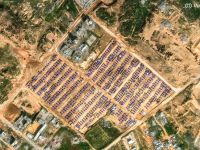The World Bank approved a $31.5 million loan to the government of Lebanon to create the conditions for increased local economic development and enhanced quality of life in the historic centers of five main secondary cities and improve the conservation and management of Lebanon’s built cultural heritage.
The proposed Cultural Heritage and Urban Development project (CHUD) will extend technical assistance and targeted investments in the cities of Baalbeck, Byblos, Saida, Tripoli and Tyre where signs of damage, decay, poverty and economic stagnation from the civil war are still visible.
Lebanon enjoys a rich cultural legacy inherited from past civilizations with five World Heritage Sites designated by UNESCO. However, most of its internationally renowned historic sites are situated in densely populated urban areas, which are typically exposed to the pressures of modern development and postwar reconstruction.
The development pressure is compounded by the fact that local governments lack the resources and mechanisms to preserve and manage these sites. As a result, the historic and archaeological sites are suffering from physical and environmental degradation, with local municipalities and residents reaping little economic benefits that come with a thriving tourism industry.
In response to these challenges, the government of Lebanon requested World Bank assistance in revitalizing historic cities and preserving cultural assets to spur local economic development. The major component of CHUD will rehabilitate historic city centers and improve urban infrastructure in and around old towns with the involvement of the private sector.
Another component will promote conservation and sustainable management of archaeological sites, primarily in Baalbeck and Tyre which are on UNESCO’s World Heritage List. The third component will provide technical assistance to help municipalities to effectively revitalize and manage historic urban cores and sites and ensure their upkeep and productive use for the benefit of local residents.
“This project treats Lebanon’s cultural assets as economic assets and integrates them into the life of the community to achieve local growth,” says Joseph Saba, World Bank country director for Lebanon. “We saw an opportunity to focus the bank’s attention on private sector development, on education and proper commercial exploitation of ancient ruins so that local residents can benefit.”
The CHUD is based on the World Bank’s country assistance strategy for Lebanon, which recognizes the importance of preserving Lebanon’s built cultural heritage and developing environment-friendly tourism. It supports the CAS’ objectives of fighting poverty by targeting underprivileged communities through small-scale upgrading of rural and urban infrastructure.
The project also received co-financing from Agence Française de Développement, the Government of France, Government of Italy and the Government of Japan. UNESCO supported the project from its inception, providing scientific oversight for all cultural heritage studies and activities. — (menareport.com)
© 2003 Mena Report (www.menareport.com)







